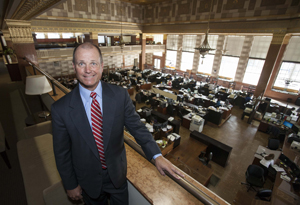Shares of Warren Buffett’s Berkshire Hathaway Inc. are famous for their hefty price tag: At $156,400 each, they’re by far the most expensive single share of any U.S. company.
Berkshire could divide its value into more moderately priced shares, but Buffett believes the high price leads to long-term stability by attracting long-term investors.
That’s the same thinking that has made shares of Farmers & Merchants Bank of Long Beach by far the most expensive on the LABJ stock index. Shares have been flirting with $5,000 for the past few months and closed April 3 at $4,900.
“It supports stability,” said Daniel Walker, the bank’s chief executive and the great-grandson of its founder. “Our shareholders hold shares for portfolio growth and value. They’re not looking to day trade. They’re not looking to come into the market, get a quick profit and get out.”
Indeed, because shares are so expensive and so scarce – there are just 131,000 outstanding – they trade infrequently and at low volume. Just 16 shares changed hands last week.
That could help explain why Farmers & Merchants’ stock has been more stable over the past year than that of comparably sized local banks such as BBCN Bancorp and PacWest Bancorp. Compared with those banks, both of which trade at less than $30 a share, Farmers & Merchants grew more slowly but without as many significant ups and downs.
But there’s more than a push for stability behind the bank’s long tradition of keeping the number of shares low and the stock price high. Edward Wedbush, president of downtown L.A. brokerage and investment bank Wedbush Inc., said the strategy is likely part cost control and part marketing.
By having just 131,000 shares and about 1,500 shareholders, Farmers & Merchants likely spends less on meetings and shareholder communications than it would if it had more lower-price shares. Wedbush also said a high stock price can signal success to potential investors.
“It wants to hold the valuation at a high level as a matter of prestige,” Wedbush said. “It’s to impress people about the richness of the company. Most people aren’t looking at the number of shares and the market cap – they’re looking at the price.”
Small cap
To be sure, Farmers & Merchants is no Berkshire. The Long Beach institution is one of the largest banks in Los Angeles County, but its market capitalization is just $637 million; Berkshire’s is $257 billion.
But the companies are alike in that they don’t tend to split their stocks. The bank has never had more than 150,000 shares outstanding; in 2008, it bought back shares to bring that figure down.
That tiny number of shares for a company of its size makes the bank an oddity. Only a handful of U.S. companies have shares worth more than $1,000. Among companies based in the county, the next most expensive stock is Public Storage at $152 a share. A single Farmers & Merchants share is worth more than a single share of every other company on the LABJ Stock Index combined. (See page 32.)
Those high-value shares have attracted many long-term investors, including families that have held Farmers & Merchants stock for several generations. Besides his own family, which remains a large shareholder, Walker said there’s at least one other that has held the company’s stock since it was first issued in 1907.
Part of the attraction for those longtime shareholders are the company’s dividends, which have been paid every quarter – through depressions, downturns and recessions – since 1916. One year’s total dividend payment has never been lower than the previous year’s.
“In 2011, I paid a dividend of $109. Last year, it was $114,” Walker said. “So my shareholders know they’re going to get $114 (a share)or more by the end of 2013.”
Jim Craig, a longtime Long Beach resident and former harbor commissioner, has owned Farmers & Merchant stock for years, in large part because of the regular dividends.
“I initially bought it as a place to park money while deciding what to do with it,” Craig said. “I usually prefer Treasury bonds, but, not to sound unpatriotic, I think Farmers & Merchants shares are better than Treasury bonds.”
Like many shareholders, Craig has connections to the bank and the Walker family that go back decades. His uncle was on the bank’s board, and Craig grew up just around the corner from Kenneth Walker, Daniel’s father and a former chief executive of the bank.
“When Dan’s father took a vacation, he turned his paper route over to me,” Craig said, remembering that Kenneth Walker was a savvy business guy who valued customer service even then. “He told me, ‘If you get any complaints, it’ll cost you 50 cents a complaint.’”
Craig still buys shares when they become available, but that’s not very often. He usually purchases them from local stock brokers who buy them from other local investors.
“There are people who have had the stock a while and want to sell two or three shares and remodel the kitchen,” he said. “If you really want it, you can find the stock someplace.”
Daniel Walker acknowledged that there’s a benefit to that scarcity: It drives demand. He said he knows Farmers & Merchants shareholders in Long Beach who boast about holding stock. He also knows would-be investors who can’t seem to find shares.
“It provides a little bit of intrigue,” Walker said. “It’s a stock you’re very pleased about owning. Sometimes people brag because they own shares and the guy across the table can’t buy any.”

